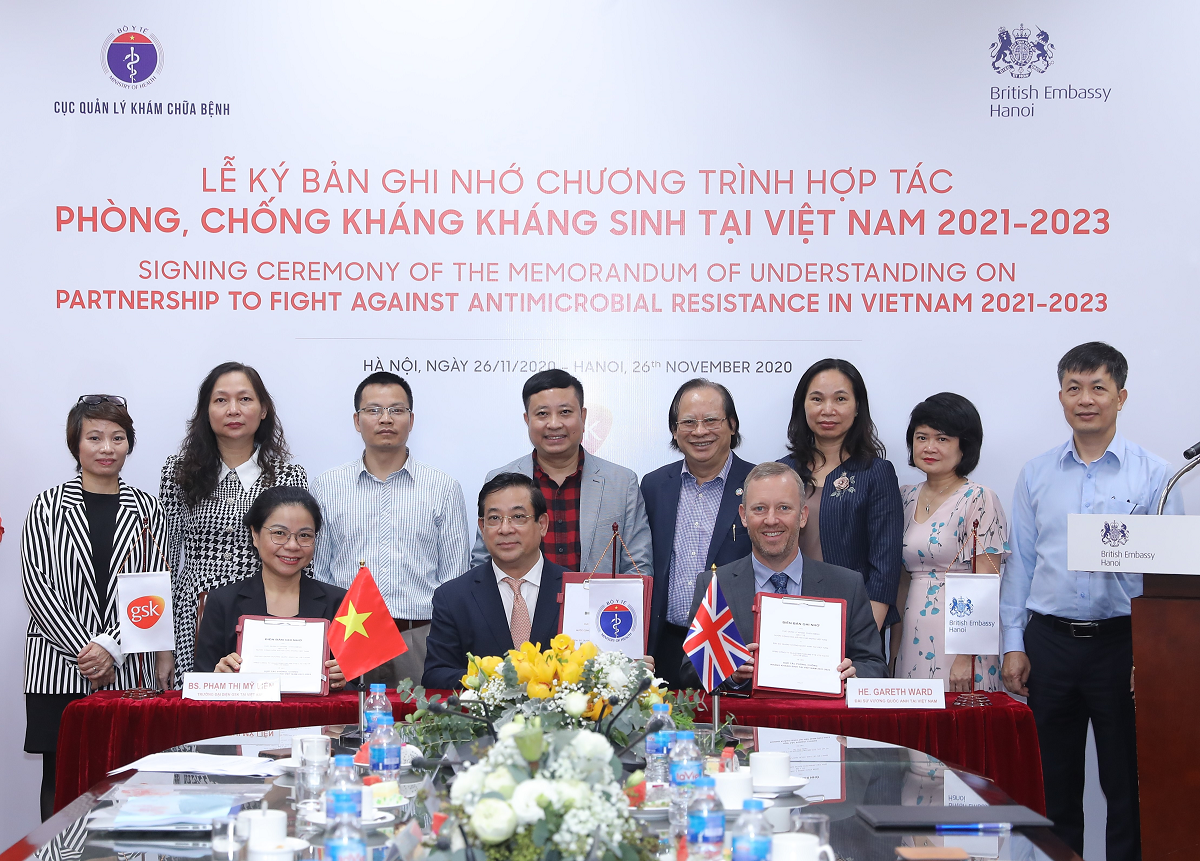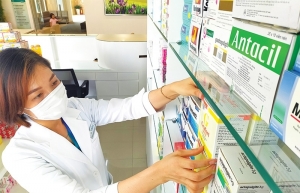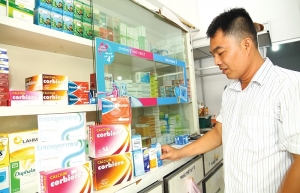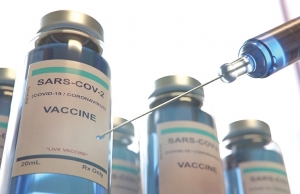Partnership signed to fight against antimicrobial resistance in Vietnam in 2021-2023
 |
| The signing ceremony on November 26 |
This healthcare partnership aims to support the Vietnamese government’s long-term strategy articulated in the National Action Plan on Antimicrobial Resistance (AMR), and aligns with the initiatives of the UK government to support developing countries in solving the AMR problem.
“The National Action Plan on Antimicrobial Resistance for 2013-2020 and the development of a strategy for the next five years are among the most important focuses of the health sector. With the companionship of the UK government and companies in the health sector such as GSK, the fight against antimicrobial resistance in Vietnam will be approached in a more comprehensive way. Ongoing medical training programmes for healthcare professionals and awareness raising support, community education are also planned to improve the effectiveness of fighting against this medical burden,” said associate professor Luong Ngoc Khue, director of Medical Service Administration, Deputy Head of Vietnam National Steering Committee for Antimicrobial Resistance.
AMR is one of the world’s most critical healthcare challenges. It occurs when microorganisms such as bacteria, viruses, fungi, and parasites change in ways that render the medications used to cure the infections they cause ineffective, caused by the inappropriate use of medicines, for example using antibiotics for viral infections such as cold or flu, or sharing antibiotics, low-quality medicines, wrong prescriptions, while poor infection prevention and control also encourage the development and spread of drug resistance. It is estimated that by 2050, the number of people dying from antimicrobial resistance could reach 10 million.
In Vietnam, rates of AMR are among the highest in Asia, causing thousands of deaths annually. Specifically, community-acquired respiratory tract infections (CA-RTIs) are a significant cause of diseases, and the impact is especially serious in Asia-Pacific countries where the high incidence of CA-RTIs combined with poor access to healthcare results in a major clinical and economic burden. Some of the most frequently occurring CA-RTIs are acute rhinosinusitis (AS), community-acquired pneumonia (CAP), and acute exacerbations of chronic bronchitis (AECB).
In addition, there are many factors contributing to the spread of AMR such as overcrowded healthcare facilities, lack of laboratory resources, insufficient trained staff to detect the issue, and inappropriate use of antibiotics by patients, pharmacists, and doctors.
Through the signing of an MoU on partnership, Vietnam’s Ministry of Health, the British Embassy in Vietnam and the representative office of GSK have pledged to carry out collaborative activities with a common goal to eliminate AMR in Vietnam.
The partnership is expected to cover three areas:
• Support capability-building and medical education for healthcare professionals (such as doctors, pharmacists) in AMR and Appropriate Antibiotic Prescribing (AAP) for community-acquired respiratory infections;
• Provide end-to-end healthcare solutions from prevention to treatment and enhance access to world-class antibiotics and vaccines;
• Increase awareness of AMR’s burden and build understanding of appropriate antibiotic use in the community to prevent AMR in the future.
Speaking at the ceremony, British Ambassador to Vietnam Gareth Ward highlighted: “The UK is committed to working with Vietnam on tackling health issues like AMR and we have raised the level of ambition within our strategic partnership agreement. Antimicrobial resistance is becoming a global health crisis and we need to increase our collective efforts to address this challenge in order to secure the health and wellbeing of our future generations.”
Lien Pham Thi My, chief representative of GSK Pte., Ltd. in Vietnam said: “For a decade, GSK has been putting efforts into reducing the progression of antimicrobial resistance globally and in Vietnam. Today's signing marks a new phase in that effort, as GSK continues its commitment to contribute solutions such as clinical data sharing, studying surveillance data relevant to community-acquired respiratory infections, collaborating with HCPs to continue their AMR medical education, and public awareness campaigns about the burden of antimicrobial resistance and preventive measures for each individual and community."
 Digitalisation prompts evolution of healthcare Digitalisation prompts evolution of healthcare |
 Replaced regulation to hit global drugmakers Replaced regulation to hit global drugmakers |
 EU vaccine pooling plans picked apart EU vaccine pooling plans picked apart |
 GSK supports global efforts in COVID-19 fight GSK supports global efforts in COVID-19 fight |
What the stars mean:
★ Poor ★ ★ Promising ★★★ Good ★★★★ Very good ★★★★★ Exceptional
Related Contents
Latest News
More News
- Congratulations from VFF Central Committee's int’l partners to 14th National Party Congress (January 25, 2026 | 09:46)
- List of newly-elected members of 14th Political Bureau announced (January 23, 2026 | 16:27)
- 14th Party Central Committee unanimously elects To Lam as General Secretary (January 23, 2026 | 16:22)
- List of members of 14th Party Central Committee announced (January 23, 2026 | 09:12)
- Highlights of fourth working day of 14th National Party Congress (January 23, 2026 | 09:06)
- Press provides timely, accurate coverage of 14th National Party Congress (January 22, 2026 | 09:49)
- Press release on second working day of 14th National Party Congress (January 22, 2026 | 09:19)
- Minister sets out key directions to promote intrinsic strength of Vietnamese culture (January 22, 2026 | 09:16)
- 14th National Party Congress: Renewed momentum for OVs to contribute to homeland (January 21, 2026 | 09:49)
- Party Congress building momentum for a new era of national growth (January 20, 2026 | 15:00)

 Tag:
Tag:
























 Mobile Version
Mobile Version